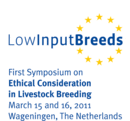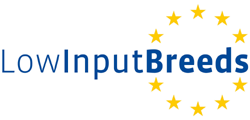First LowInputBreeds Symposium on Ethical Consideration in Livestock Breeding

First LowInputBreeds Symposium on Ethical Consideration in Livestock Breeding
March 15 and 16, 2011, Wageningen, The Netherlands
www.lowinputbreeds.org/symposium-2011.html
LowInputBreeds: Key facts & figures
Development of integrated livestock breeding and management strategies to improve animal health, product quality and performance in European organic and ‘low input’ milk, meat and egg production - LowInputBreeds
- 5-year EU Collaborative Project, funded under the Seventh Framework Programme of the European Community for Research, Technological Development and Demonstration Activities
- Contract No. 222623
- 94 person-years of research
- Over 60 scientists
- 21 leading research and industrial organisations
- 15 countries
- 4 livestock species: cattle (dairy and beef), sheep (dairy and meat), pigs, poultry
- Running from 2009-2014
- Project coordination: Newcastle University and Research Institute of Organic Agriculture FiBL
- www.lowinputbreeds.org

First LowInputBreeds Symposium: Programme & presentations
March 15, 2011
11.00-13.00
Plenary session: Ethical aspects related to methodologies in breeding and reproduction
- Welcome
Veronika Maurer, FiBL, scientific coordinator of the LowInputBreeds project - Ethical Concerns in LowInputBreeds: Background Paper
Karsten Klint Jensen, Danish Centre for Bioethics and Risk Assessment (CeBRA)
Abstract - Presentation - Reproduction methods in breeding, effects, risks and benefits
Jozsef Ratky, Research Institute on Animal Breeding, Hungary Abstract (39 KB)-
Abstract (39 KB)-  Presentation (641 KB)
Presentation (641 KB) - Genomic selection and the alternatives, risks and benefits
Jack Windig, Wageningen UR Livestock Research Abstract (81 KB)
Abstract (81 KB) - An organic perspective on reproduction methods and (genomic) selection
Anet Spengler Neff, FiBL, and Wytze Nauta, Louis-Bolk-Institute Abstract (78 KB) -
Abstract (78 KB) -  Presentation (904 KB)
Presentation (904 KB) - Discussion
Moderator: Karsten Klint Jensen, Danish Centre for Bioethics and Risk Assessment (CeBRA)
14.00-15.30
Parallel sessions for each species group in LowInputBreeds
14.00-14.15: Aims of the Breeding Research in the LowInputBreeds Project and the Methods to be Used
- Subproject 1: Dairy Cows and Beef Cattle
Filippo Biscarini, University of Göttingen and Sven König, University of Kassel
Abstract (38 KB) - Presentation (335 KB)
Presentation (335 KB) - Subproject 2: Sheep
Hervé Hoste, INRA Abstract (29 KB)-
Abstract (29 KB)-  Presentation (192 KB)
Presentation (192 KB) - Subproject 3: Pigs
Jan Merks, Institute for Pig Genetics IPG Abstract (54 KB)-
Abstract (54 KB)-  Presentatio (307 KB)
Presentatio (307 KB) - Subproject 4: Laying hens
Ferry Leenstra, Livestock Research, Wageningen University
Abstract (83 KB) - Presentation (84 KB)
Presentation (84 KB)
14.15 -14.30: Ethical Problems and Breeding Goals
- Subproject 1: Dairy Cows and Beef Cattle
Henner Simianer, University of Göttingen Presentation (517 KB)
Presentation (517 KB) - Subproject 2: Sheep
Smaro Sotirako, NAGREF Presentation (112 KB)
Presentation (112 KB) - Subproject 3: Pigs
Sandra Edwards, Newcastle University
Abstract (44 KB) - Presentation (337 KB)
Presentation (337 KB) - Subproject 4: Laying hens
Veronika Maurer, FiBL
Abstract (51 KB) - Presentation (490 KB)
Presentation (490 KB)
14.30-14.45 Critical Comment
- Subproject 1: Dairy Cows and Beef Cattle
Wytze Nauta, Louis Bolk Institute, coordinator ECO-AB - Subproject 2: Sheep
Marijke de Jong, Dutch Animal Protection Presentation (289 KB)
Presentation (289 KB)
(See also abstract (36 KB) by Joanne Conington, Scottish Agricultural College, who could not attend the meeting)
abstract (36 KB) by Joanne Conington, Scottish Agricultural College, who could not attend the meeting) - Subproject 3: Pigs
Anna Wallenbeck, Swedish University of Agricultural Sciences
Abstract (47 KB) - Subproject 4: Laying hens
Gerard Albers, ISA Hendrix Genetics Presentation (114 KB)
Presentation (114 KB)
14.45-15.30 Questions and discussion (summarizing problem areas for workshop on March 16)
Moderation by Karsten Klint Jensen, Danish Centre for Bioethics and Risk Assessment (CeBRA)
March 15, 16.00-17.15
Plenary sessions, input from outside LowInputBreeds: Specialization and high input vs low input
- Breeding Goals
Anne-Marie Neeteson, FABRE TP Presentation (518 KB)
Presentation (518 KB) - Contribution of low-input livestock farming to biodiversity conservation
Irene Hofmann, Food and Agriculture Organisation of the United Nations (FAO) Abstract (370 KB)-
Abstract (370 KB)-  Presentation (1.1 MB)
Presentation (1.1 MB) - Animal welfare
Chris Atkinson, Soil Association, UK - Utilisation of resources
Tom Dedeurwaerdere, University of Louvain Abstract (76 KB)
Abstract (76 KB) Discussion
March 15, 2011: Evening
- LowInputBreeds: General assembly
- ECO-AB: General meeting
March 16, 2011
9.00 - 10.00: Low input breeds, utilization of resources and climate change
- LowInputBreeds and climate change
Jorgen Elvind Olesen, Aarhus University, Denmark
Abstract (56 KB) - Lifestock production systems and future food security?
Gillian Butler, Julia Cooper, Steve Wilcockson and Carlo Leifert, Newcastle University/Nafferton Ecological Farming Group Presentation (606 KB)
Presentation (606 KB) - Discussion
March 16, 10.30-12.00: Parallel workshops, discussion of ethical aspects, 4 groups, species oriented
- Setting the scene, compilation by moderator of input from previous sessions
Moderator from work package 5.2 of the LowInputBreeds project - 10.40-11.50 Discussion
- 11.50-12.00 Conclusions, remaining questions
13.30-14.30: Plenary session, reflection
- 13.30-13.50 Reports from the parallel workshops (five minutes each)
- 13.50-14.05 Reflection by ECO AB
Anet Spengler, FiBL and Wytze Nauta, Louis Bolk Institute - 14.05 - 14.20
 Reflection by EU policy (264 KB)
Reflection by EU policy (264 KB)
Anne-Sophie Lequarré - 14.20-14.30 Discussion
Karsten Klint Jensen, Danish Centre for Bioethics and Risk Assessment (CeBRA)
 This website was archived on December 19, 2017 and is no longer updated.
This website was archived on December 19, 2017 and is no longer updated.



